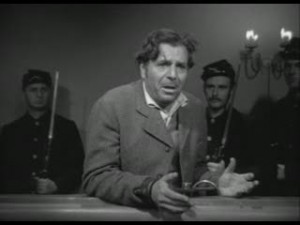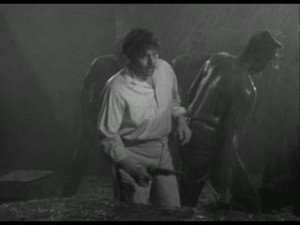John Ford’s 1936 historical drama The Prisoner of Shark Island tells in a fairly straightforward and accurate manner the story of Dr. Samuel Mudd. Mudd is famous as the doctor who treated an injured John Wilkes Booth after the latter’s assassination of President Abraham Lincoln.
As in the historical record, Mudd is very successful in combating the epidemic, although he takes ill himself in the process. As a result of his heroic efforts, President Andrew Johnson pardons Dr. Mudd who then returns home.
 The middle third of the film is by far the best and is where most of the action occurs. The final act is quite weak and its sappy ending of Mudd and Buck (one of Mudd’s slaves also imprisoned on Shark Island) returning home to their families -almost hand in hand- weakens the film significantly. Although including Buck in the final scenes is a credit to Ford given the era of the film (a rather liberal thinking inclusion) a more appropriate ending would have been the pardoning of Dr. Mudd.
The middle third of the film is by far the best and is where most of the action occurs. The final act is quite weak and its sappy ending of Mudd and Buck (one of Mudd’s slaves also imprisoned on Shark Island) returning home to their families -almost hand in hand- weakens the film significantly. Although including Buck in the final scenes is a credit to Ford given the era of the film (a rather liberal thinking inclusion) a more appropriate ending would have been the pardoning of Dr. Mudd.
Warner Baxter, a somewhat overlooked actor today, gives a very strong performance throughout the film, bringing passion and power to the role of the good Dr. Mudd. Although overworked after his Best Actor nod for 1930’s In Old Arizona, Baxter gives one of his best performances here. As Dr. Mudd is in almost every scene his success drives the film as well. Of particular note is Mudd’s forceful speech from the dock- a true showpiece if there ever was one.
An odd musical note – no pun intended- is the repeated playing of “O Christmas Tree“, which makes no sense to this reviewer. If you’ve seen the film and have an answer please let me know. And yes, I mean the Christmas carol.
Although the film would not play well in today’s politically correct times – Dixie is requested (and played) early on by a soon to be gone President Lincoln. This motif returns several times throughout. This coupled with the depiction of slavery – and of African-Americans as weak minded and servile- including some of the language involved- show the times in which the film was made. And although surely done to appease audiences of the time it rankles today’s modern sensibilities.
The late 1930s were, for the most part, a period which looked sympathetically on the old South. (Note Gone with the Wind, for example.) Taken in that context Ford’s work is representative of its times. As an aside, Gone with the Wind is significant here at least in the magnitude of character depth given to the slaves of Tara. Hatie McDaniel won an Oscar for her work.
Not a must see film by any means, but a must see for fans of John Ford’s body of work. As one of his reputed personal favorites it also demonstrates his love of the Civil War. Unfortunately the film has seldom been seen on the cable listings in the last few years, but has recently been released on DVD as part of the Ford at Fox series.

Regarding your consideration of the musical note: “Oh Christmas Tree” – this was adopted as the State Song of Maryland – “Oh Maryland, My Maryland” and was like Dixie a favorite of the South during the
Civil War. It is also heard in the soundtrack of “Gone With The Wind”. “Oh Tannenbaum”, i.e. “Oh Christmas Tree” was adopted and different words added depending upon the times and period, “What Child Is This?”, (Greensleeves) and later in the motion picture “How The West Was Won” – “Away. Away Come Away With Me” sung by Debbie Reynolds.